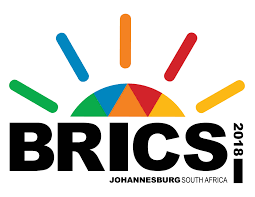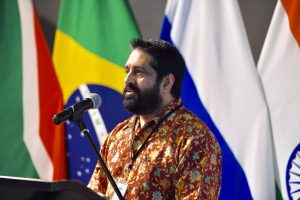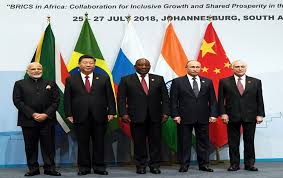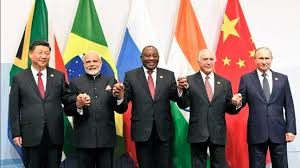
The BRICS summit in Johannesburg was unique in many ways as it not only marked the 10 th anniversary of this grouping of emerging powers, but also culminated in an ambitious joint declaration to bolster intra-BRICS unity against the rising tide of protectionism and unilateralism. In this interview with Manish Chand, Editor-in-Chief, India and World and India Writes Network, in Johannesburg, Anil Sooklal, South Africa’s BRICS Sherpa, speaks eloquently about the pivotal role of the BRICS in promoting reformed multilateralism at a time when the WTO-centred trading order is under siege.

Sooklal, Deputy Director-General responsible for Asia and the Middle East in South Africa’s Department of International Relations and Cooperation (DIRCO), also makes a compelling case for BRICS to take the leadership to fast-track reform of the global governance architecture, which was endorsed by the leaders of BRICS countries and reflected in the Johannesburg Declaration. Looking ahead, Sooklal, who is also South Africa’s G20 Sherpa and IBSA (India-Brazil-South Africa) Sherpa, strikes an upbeat note on the future trajectory of BRICS-Africa outreach.

Q) What are major takeaways from the 10 th BRICS summit in Johannesburg in terms of the evolution of the BRICS grouping as a major force on the international stage?
A) It was a landmark summit in so far as it was the 10th anniversary of the BRICS summits, and it also had some new dimensions to it which made it unique. We had, for the first time, a BRICS retreat of leaders, which was a novelty in the BRICS format. The retreat was an appropriate moment and an opportunity to exchange perspectives and reflect on the way ahead in an informal setting.
We have had a whole decade of summits, and it’s been a very wide-ranging cooperation that has evolved since the group started off. In 2006, BRICS met informally for the first time at the level of Foreign Ministers on the margins of the UNGA, and in 2007 they met again in that format. They decided to elevate the BRICS high-level interaction into to a full summit in 2009 in Yekaterinburg. By the end of 2010, they decided to invite South Africa. And in 2011 the BRIC grouping turned into BRICS, with a capital S.The BRICS started off initially as an economic grouping, but today the BRICS cooperation has evolved to encompass the whole spectrum of cooperation that entails the BRICS family.
The main pillars of BRICS cooperation, which are reflected in the Johannesburg Declaration, focus on strengthening political and security cooperation, addressing global challenges and also trying to see how we can converge in terms of having common positions.Secondly, the Johannesburg summit focused on enhancing cooperation in terms of reforming and strengthening global governance in the economic and financial sector. The third pillar is strengthening people-to-people cooperation and interaction. Besides these three key pillars, we continue to work on the fourth pillar, which is to address issues related to an institutional mechanism and to explore how we can cooperate better so that our working mechanism is refined.
The Johannesburg declaration this year also had an added stand-alone dimension: strengthening multilateralism and global governance reforms.
Q) The BRICS’ overarching strategic objective has been reform of the global governance architecture. This time round, the context is different. How do you look at the BRICS cooperation in the age of Trump, marked by a sharp rise in unilateralism and right-wing nationalism? How do you look at PM Modi’s idea of reformed multilateralism?
A) The terminology used by Prime Minister Modi found acceptance amongst all of us – a reformed multilateralism is exactly what we need at this moment in time, given the challenges the global community is facing. When the BRICS leaders first got together in Yekaterinburg at the first summit, multilateralism was not under siege. Multilateralism was the central pillar; the centrality of the United Nations was accepted by all of us.
But today, the very centrality of that UN system is under threat and the whole architecture of multilateralism, be it within the political-security realm or the economic and trade regime, is being undermined by actions that are being taken by certain individuals and countries. This is threatening the very fabric that is keeping us together in addressing global challenges as a collective in an open democratic manner.
In this backdrop, there was a very strong message from the BRICS leaders; all five of them spoke in one voice that we will work together to strengthen multilateralism and to keep the global governance issue of reforming these institutions at the very centre, to make them more representative, and to change these institutions for the better. But if we look at what is happening now, the very fabric of multilateralism is being undermined by unilateralism,protectionist and populist measures and anti-globalisation movements. And that is not the direction that the BRICS would like to see the world moving.Therefore, at the retreat, there was a very clear call made by the leaders that the BRICS must show leadership in the world community at the present time. That message came out, not just from the BRICS leaders, but also from the Africa Outreach and BRICS-Plus Outreach that the BRICS leaders held in Johannesburg. Besides the BRICS countries, a sizeable number of countries participated in these meetings. And all of them endorsed the call of our leaders that we need to reinforce and strengthen multilateralism, speak out against unilateralism, against protectionism and reinforce the global trading architecture through the World Trade Organisation.
Q) Reforming global governance architecture was a recurring theme in all the 10 BRICS summits. However,for this collective commitment towards reforming global governance architecture, two permanent members of the UN Security Council, namely China and Russia, have yet to come out vocally in support of the UN Security Council aspirations of the other three members. How do you look at the lack of movement on thisfront?
A) The formulation on the UNSC reforms in the BRICS joint declarations has remained the same. Although it’s a repetition of the same formulation, I must say that during the Sherpa meeting and in the Foreign Ministers meeting,there was a very robust discussion on this issue. South Africa, Brazil and India have articulated their desire to have a seat in the reformed Security Council that is more representative of all regions of the world. We would like to see this happening sooner rather than later because the ongoing negotiations at the UN seem to be going nowhere and the pace of development is very slow; so, there is a level of anxiety and frustration. The leaders of South Africa,
Brazil and India have underlined this point forcefully at the Johannesburg summit. In his address, Prime Minister Modi rightly said that you cannot speak of reformed multilateralism without including the reform of the United Nations Security Council. We strongly support that message and that message was also echoed very strongly by Brazil’s President Michel Temer, who said precisely the same thing as PM Modi, that BRICS must start taking a leadership position on this issue.

OUTREACH TO AFRICA
Q) The 10 th BRICS summit saw an unprecedented outreach to Africa. How will the BRICS grouping contribute to the resurgence of Africa?
A) What is really important is that BRICS is articulating the very issues the Africa sees at the heart of its development. BRICS is also articulating the very issues that Africa sees at the core of its peace and stability agenda as well as its political agenda. Leaders of all African countries embraced the Johannesburg Declaration and endorsed all the issues and ideas raised by BRICS leaders. The BRICS leaders were unanimous in wanting closer competition and interaction with BRICS countries. There was a clear mandate coming from the African leaders that what the BRICS stands for, and what it articulates on global platforms, is also what they would like BRICS to be doing for Africa.
China’s President Xi Jinping spoke extensively about involvement in Africa through FOCAC. PM Modi spoke extensively of India’s deep involvement in the African continent. Likewise, Russian President Vladimir Putin made a very important announcement that Russia is going to be hosting a Russia-Africa Forum soon. That’s a very new development. I must refer to the first outreach we had with Africa during 2013. After that outreach, President Putin met South Africa’s then President Zuma and thanked him for re-introducing Africa to Russia. Brazil is also increasing its presence in Africa; it is opening new missions in Africa, and it’s widely represented across the continent.
BRICS is, therefore, acting as a stimulus in strengthening the interface between Africa and the BRICS countries.The overarching sentiment that emerged was that African countries want closer association with BRICS as thisengagement brings an added value to Africa. There were also discussions on launching a formal mechanism for institutionalising AU-BRICS relationship. Likewise, Argentina President Mauricio Macri, the chair of G20, and Jamaica’s PM Andrew Holness, the chair of CARICOM, said that they would like to have closer engagement with Africa.
Q) Going ahead, do you see competition or rivalry among BRICS countries, especially India and China, in Africa?
A) Africa is a vast continent, comprising 54 countries and 1.2 billion people; and its development needs are vast.There is enough space in the African continent for all of our partners to develop cooperation programmes to help Africa advance its 2063 development agenda. We have indicated to our BRICS partners that Africa should not, however, become a competition or contestation platform.
On the contrary, we should look at how each BRICS country has its unique strengths, which should be harnessed for the development of Africa. BRICS countries have diverse strengths: Russia is very strong in the energy sector, Brazil is strong in agriculture; China is very strong in the manufacturing sector; India is very strong in the ICT sector; and all these skills are needed in Africa. Therefore,each BRICS country can play a unique role in sectors in which they are emerging as global leaders and have their unique strengths. There will be some level of competition, which is natural, but it should not become destructive and counter-productive to Africa’s development. This message has been embraced by BRICS leaders. We are all working in tandem, and are developing programmes for the benefits of Africa and the BRICS.
Q) How do you see India’s model of engagement with Africa?
A) India has a very ambitious connectivity programme with Africa because of its strength in the ICT sector. India is very strong in the agricultural sector as well as in the manufacturing sector. Many Indian companies have manufacturing plants across Africa, including in South Africa. Before the BRICS summit, PM visited Rwanda and Uganda; likewise, Chinese President Xi Jinping visited Rwanda, Senegal and Mauritius. We welcome this kind of interaction between BRICS countries and the African continent. By and large, African leaders spoke very positively about engagement of BRICS countries with Africa.
Author Profile
- India Writes Network (www.indiawrites.org) is an emerging think tank and a media-publishing company focused on international affairs & the India Story. Centre for Global India Insights is the research arm of India Writes Network. To subscribe to India and the World, write to editor@indiawrites.org. A venture of TGII Media Private Limited, a leading media, publishing and consultancy company, IWN has carved a niche for balanced and exhaustive reporting and analysis of international affairs. Eminent personalities, politicians, diplomats, authors, strategy gurus and news-makers have contributed to India Writes Network, as also “India and the World,” a magazine focused on global affairs.
Latest entries
 DiplomacyJanuary 5, 2026India walks diplomatic tightrope over US operation in Venezuela
DiplomacyJanuary 5, 2026India walks diplomatic tightrope over US operation in Venezuela India and the WorldNovember 26, 2025G20@20: Africa’s Moment – The Once and Future World Order
India and the WorldNovember 26, 2025G20@20: Africa’s Moment – The Once and Future World Order DiplomacyOctober 4, 2025UNGA Resolution 2758 Must Not Be Distorted, One-China Principle Brooks No Challenge
DiplomacyOctober 4, 2025UNGA Resolution 2758 Must Not Be Distorted, One-China Principle Brooks No Challenge India and the WorldJuly 26, 2025MPs, diplomats laud Operation Sindoor, call for national unity to combat Pakistan-sponsored terror
India and the WorldJuly 26, 2025MPs, diplomats laud Operation Sindoor, call for national unity to combat Pakistan-sponsored terror







